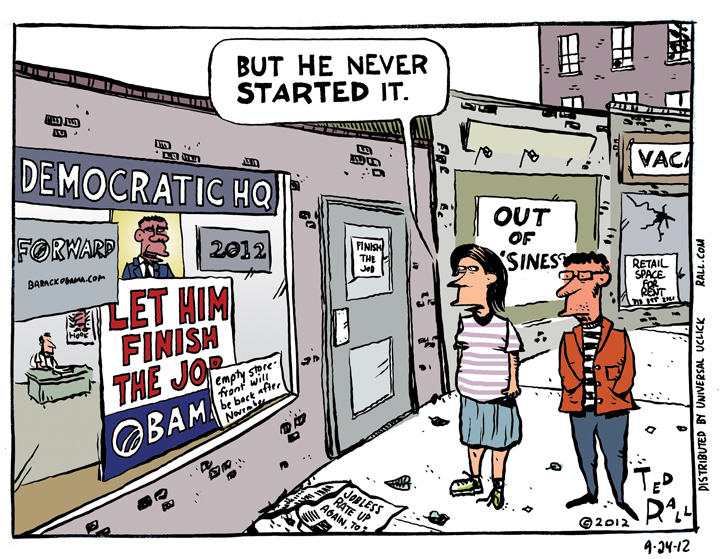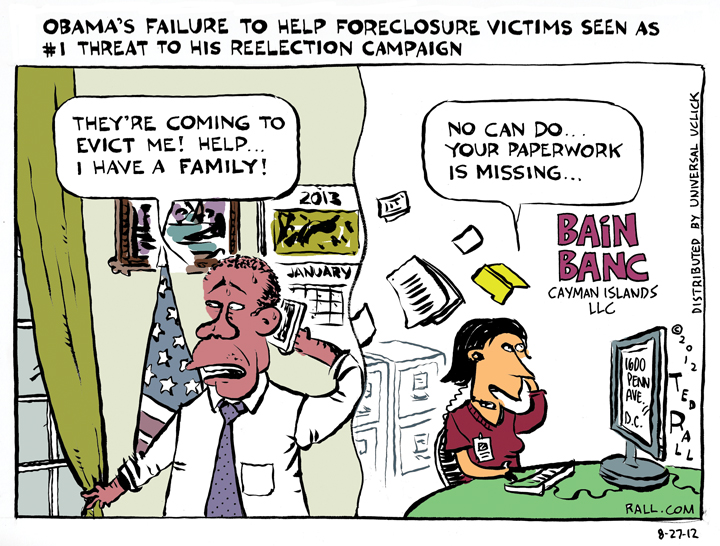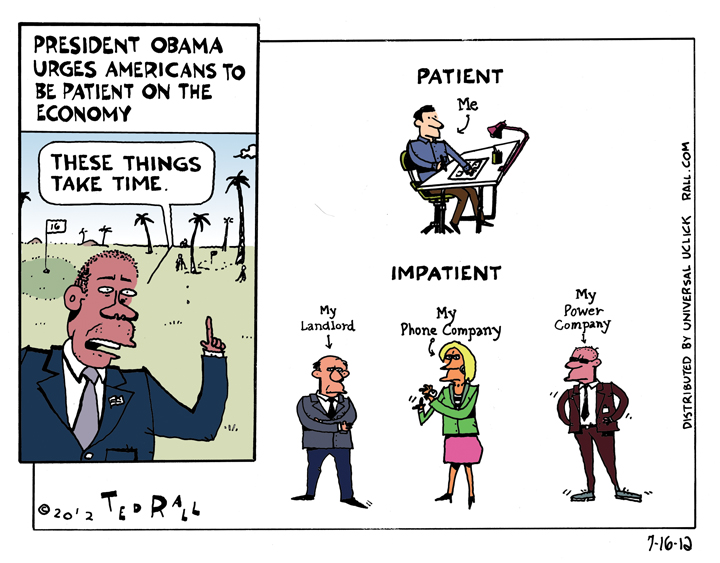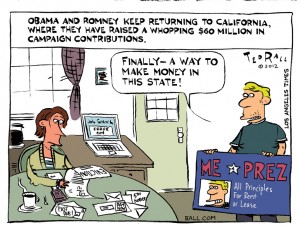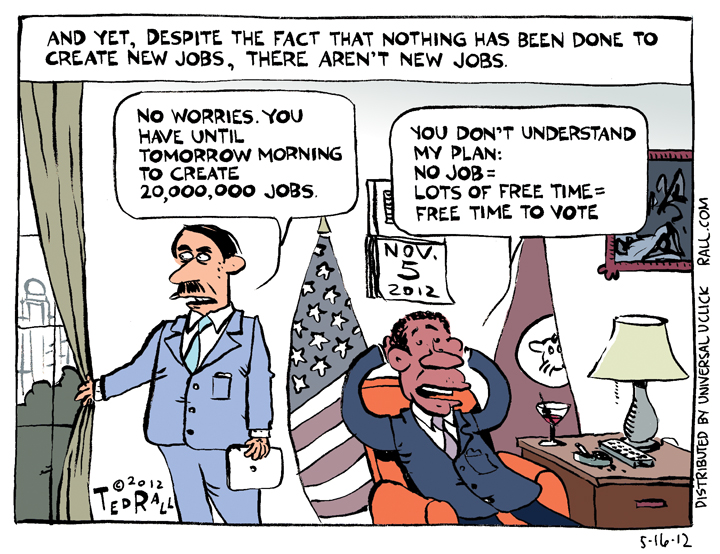Barack Obama is asking to be given the chance to finish the job. The trouble is, he never started it.
SYNDICATED COLUMN: The Rebranding of the President, 2012
Why Is Obama Running on His Record?
“It’s not clear what [President Obama] is passionate to do if he is elected for another four years,” writes David Brooks, conservative columnist for The New York Times. “The Democratic convention is his best chance to offer an elevator speech, to define America’s most pressing challenge and how he plans to address it.”
Addressing the DNC Wednesday night, Bill Clinton came as close as any Democrat has this year to answering Brooks: “In Tampa, the Republican argument against the president’s reelection was pretty simple: We left him a total mess, he hasn’t finished cleaning it up yet, so fire him and put us back in. I like the argument for President Obama’s reelection a lot better.”
Nicely done—though this argument only works for voters stuck in the two-party trap. But the biggest piece is still MIA: Obama’s domestic and foreign policy agenda for a second term.
Two principal arguments are being advanced in favor of Obama’s reelection: first, that he “took out” Osama bin Laden; second, that we are “absolutely” better off economically than we were four years ago. These arguments, if they continue to be the Democrats’ main talking points, will lead Obama to defeat this fall.
U.S. history shows that the candidate who presents the most optimistic vision of the future usually prevails. The future he sells doesn’t have to be specific (Romney’s 12 million new jobs, say). Ronald Reagan, who projected vague aw-shucks optimism reflected by a 100%-pabulum campaign slogan, “It’s Morning in America,” defeated Jimmy “Malaise” Carter and Walter “Let’s Tell the Truth About Taxes” Mondale. (Never mind that Carter and Mondale were more honest, smarter and nicer.)
Obama followed the Reagan model in 2008: hope, change, charming smile, not a lot of specifics. And it worked. (It didn’t hurt to run against McCain, the consummate “get off my lawn, you damn kids” grouch.) So why is Obama trading in a proven winner? Why is he running on his first-term record?
Obama’s entourage has obviously talked themselves into believing that the president’s record is better than it really is—certainly better than average voters think it is. Grade inflation is inevitable when you evaluate yourself. (In 2009, at the same time the Fed was greasing the banksters with $7.77 trillion of our money—without a dime devoted to a new WPA-style jobs program—he gave himself a B+.)
First, the extrajudicial assassination of bin Laden, an act of vengeance against a man in hiding who had been officially designated to pose no threat since at least 2006, makes some people queasy. Sure, many voters are happy—but getting even for crimes committed more than a decade ago still doesn’t spell out an optimistic vision for the future.
Similarly, and perhaps more potently since jobs are the most important issue to Americans, claiming that we are better off than we were four years ago, either personally, or nationally, is a dangerous argument for this president to make. Four years ago marks the beginning of a financial crisis that continues today. GDP remains a low 1.7%. Credit remains so tight that it’s still strangling spending.
Four million families lost their homes to foreclosure, millions more were evicted due to nonpayment of rent, and a net 8 million lost their jobs under Obama. Structural unemployment is rising. New jobs are few and pay little.
Most Americans—by a nearly two-to-one margin—feel worse off now than they did four years ago. Coupled with the media’s ludicrous claim that the recovery began in mid-2009, Obama’s “who are you going to believe, me or your lying eyes” (or pocketbook) sales pitch is so insulting and reminiscent of George H.W. Bush’s tone-deaf attitude during the 1992 recession that it can only prove counterproductive.
The historical lesson for Obama is 1936. Franklin Roosevelt is the only president in recent history to have won reelection with unemployment over 8%, as it is currently (it was 17%). Why? FDR’s New Deal showed he was trying hard. And things were moving in the right direction (unemployment was 22% when he took office). Fairly or not, Obama can’t beat Romney pointing to improvement statistics don’t show and people don’t feel.
Obama must articulate a new vision, relaunching and rebranding himself into something completely different—in other words, running as though the last three four years had never happened. Like this was his first term.
New image. New ideas. New policies. New campaign slogan.
Not only does Obama need to float big new ideas, he needs to convince voters that he can get them through a GOP Congress. Not an easy task—but there’s no other way.
It isn’t enough to simply say that Romney will make things worse. Lesser-evil arguments are secondary at best. As things stand now, with people angry and disappointed at government inaction on the economy, Romney’s “Believe in America” meme—though stupid—is more potent than Obama’s reliance on fear of a Ryan budget.
(Ted Rall’s new book is “The Book of Obama: How We Went From Hope and Change to the Age of Revolt.” His website is tedrall.com. This column originally appeared at NBCNews.com’s Lean Forward blog.)
COPYRIGHT 2012 TED RALL
Help!
Obama tried to finesse his response to the housing crash, rejecting a bailout of homeowners facing foreclosure in favor of a limited aid program and a bet that a recovering economy would take care of the rest. Millions of people lost their homes and the recovery never materialized. The economy is now the primary threat to Mr. Obamaâs bid for a second term, and economists and political allies say the Obama’s non-response to the housing crisis was the administrationâs most significant mistake.
SYNDICATED COLUMN: Lead, or Follow and Get Out of the Race
Voters Turn Against Pols’ Follow-the-Polls Strategy
In order to be a good leader, Disraeli said, “I must follow the people.”
Aided and abetted by toe-sucking pollster Dick Morris, Bill Clinton finessed the art of leading from the rear, relying on Morris’ tracking surveys to help him decide everything from whether to bomb Serbia to when and if to take a vacation.
By definition, however, leaders point where their followers should go. Americans haven’t seen much real leadership on the federal level since Reagan. Where there’s been progress, such as on gay rights, the President only stepped forward after public opinion had shifted enough to make it safe.
For the first time in 30 years, Dick Morris’ follow-the-voters strategy appears to be running out of steam. This year, the electorate seems to be hungering for presidents in the mold of TR, FDR and LBJ—old-school leaders who painted ambitious visions of where America could go and why it should, who took political gambles that the people might not be ready for what they had in mind, who anticipated crises and challenges before anyone else, and explained why we had to act sooner rather than later.
The craving for leadership is evident in the polls. Though personally popular and enjoying the advantages of incumbency, President Obama is running neck and neck against Mitt Romney, an awkward candidate from a minority religion who has trouble connecting with, and is seen as out of touch by, ordinary voters.
Democrats must be worried. Historically, Republican presidential nominees typically gain on Democrats throughout the fall. At this point in the game, Democrats need a substantial lead in order to emerge victorious in November.
What’s going wrong? Mainly, it’s the economy. It sucks. Still. Democrats say the President inherited the meltdown from Bush. But Americans blame Obama.
“The nation’s painfully slow pace of growth is now the primary threat to Mr. Obama’s bid for a second term, and some economists and political allies say the cautious response to the housing crisis was the administration’s most significant mistake,” reports The New York Times. Obama’s big screw-up: “He tried to finesse the cleanup of the housing crash, rejecting unpopular proposals for a broad bailout of homeowners facing foreclosure in favor of a limited aid program—and a bet that a recovering economy would take care of the rest.”
Recovery? What recovery?
The depressed housing market, coupled with the reduced purchasing power of tens of millions of Americans who lost their homes to eviction and/or foreclosure, makes recovery unlikely to impossible for the foreseeable future.
Many people, including yours truly, warned that the millions of Americans who were evicted under foreclosure, many of them illegally, were more “too big to fail” than Citigroup. Some, like former Congressman Jim Marshall (D-GA), voted for TARP, but urged the Obama Administration to condition the bailout on forcing the banks to refinance mortgages and write down principal to reflect the new reality of lower housing prices. “There was another way to deal with this, and that is what I supported: forcing the banks to deal with this. It would have been better for the economy and lots of different neighborhoods and people owning houses in those neighborhoods,” Marshall says.
Voters aren’t mad at Obama for not being clairvoyant. They’re pissed off because he ignored people who were smart and prescient in favor of those who were clueless and self-interested, like Tim Geitner. He may be about to pay a price for that terrible decision.
Tens of millions of Americans already have.
Speaking of leadership—the art of seeing what comes next and doing something about it—what looming problems are the political class ignoring today?
It’s too late to stop the 2008-to-2012 economic meltdown. But it’s still possible for Obama (or, theoretically, Romney) to get ahead of the economy—permanent unemployment benefits, anybody?—and other pressing issues.
Australia, for example, is taking the climate change crisis seriously.
Americans want leaders who point the way forward, to anticipate monsters we can’t yet imagine. For example, there is a huge looming crisis: pensions. In 10 to 15 years, Generation Xers will hit traditional retirement age. How will they eat?
Close to none have traditional defined-benefit pension plans. Gen Xers, who earn far less than the Baby Boomers at the same age, have been shunted into 401(k)s, which turned out to be a total ripoff: the average rate of return between 1999 and 2010 was 0.3 percent.
Total.
And much of that was withdrawn—under penalty—to subsist after layoffs.
“[Gen Xers] have no savings, and what they had was devastated by two market crashes,” said Andrew Eschtruth of the Center for Retirement Research. “They never got off the ground.”
If you’re 45 years old now and just beginning to save for retirement, financial planners say you should save 41 percent of your income annually (if you haven’t gotten laid off again). As if. Half of Gen Xers live hand to mouth; the rest save a piddling six percent a year.
The Gen X retirement crisis represents 46 million people waiting for a savior—and 46 million potential votes.
Attention Mssrs. Obama, Romney and anyone else presenting yourself as a would-be leader: Don’t just read the polls. Don’t follow us. Show that you care about, and have a credible plan to confront, the problems of the future. If you do that—and we’re not holding our breaths—we’ll pay attention to you.
(Ted Rall’s new book is “The Book of Obama: How We Went From Hope and Change to the Age of Revolt.” His website is tedrall.com. This column originally appeared at NBCNews.com’s Lean Forward blog.)
COPYRIGHT 2012 TED RALL
SYNDICATED COLUMN: Fear of a Right Planet
Romney-Ryan Extremism Could Revive Liberal Support for Obama
Soviet citizens had to be Kremlinologists, studying subtle linguistic and tonal shifts in state propaganda, noting the seating order of party leaders at official functions, in order to predict the future direction of their lives. So too are we Americans, for without any way to really get to know our politicians—their press conferences and interviews are too infrequent and carefully stagemanaged, unchallenged by compliant journalistic toadies—we are reduced to reading signals.
Even to an alienated electorate, the tealeaves are easy to read on the Republican side.
Between Romney’s selection of Paul Ryan as his running mate, his team of Dubya-rehash economic advisors (because that worked out so well) and Tea Party favorite Chris Christie as keynote speaker at this year’s Republican National Convention, the Republican Party is in danger of doing something that seemed impossible just a few months ago: strengthening support among the liberal base of the Democratic Party for President Obama.
Granted, disappointed lefties will not soon forget Obama’s betrayals. Guantánamo, the concentration camp that supposedly holds “the worst of the worst” terrorists, remains open—although, now that the White House is reportedly negotiating with the Taliban to exchange captured Afghan ministers for an American POW, one assumes they’re not all that bad. The drone wars against Afghanistan, Pakistan, Yemen and elsewhere are an affront to basic morality, logic and decency. On the economy, this tone-deaf president has yet to propose a jobs program, much less try to push one through Congress.
But many progressives, until recently threatening to sit on their hands or cast votes for a third party, are reconsidering, weighing disgust against gathering terror as they read the signals from the gathering storm in Tampa. Where Obama fails to inspire enthusiasm, the Romney team seems determined to generate as much fear as possible that he plans to shove the needle even further to the radical right than Reagan or Bush.
Romney, who abandoned his history as a centrist Massachusetts Republican and is running as a right-winger, chose to balance his newfound extremism with Paul Ryan, an even-more-right-winger. Ryan is a vicious, overrated ideologue whose greatest achievement, his theoretical budget proposal, paints a picture of America as a dystopian hell where an infinitely funded Pentagon wages perpetual war and the top 1% of the top 1% party on tax cuts while the elderly and poor starve or succumb to treatable diseases, whichever kills them first. (In the media today, this gets you lionized as “smart,” “wonky,” and “an intellectual heavyweight.” Ryan = Sartre.) Lest you wonder whether the Ryan selection is an anomaly, wonder not—from Christie to the stump speeches to the men first in line to join a Romney cabinet, everything about Team Romney screams Tea Party, Rush Limbaugh, Ann Coulter, Ayn Rand minus the cool atheism and elitism.
This is a Republican Party that Barry Goldwater wouldn’t recognize, batso nutso, stripped of the last veneer of libertarianism, completely owned by and in thrall to figures whom the media would characterize as “extreme nationalist” or “neo-Nazi” if they spouted the same nonsense in other countries.
If I were advising Romney, I would tell him that cozying up to the lunatic fringe of American pseudoconservatism is not a prescription for victory in November, when the outcome hinges upon seducing that 5% or 10% of voters who swing both ways. Ryan isn’t as crazy (or bold) of a choice as Sarah Palin, but what Republicans don’t understand is that conservatives will vote Republican regardless of who is the vice presidential running mate or, for that matter, who is the Republican nominee for president. Lack of enthusiasm among the base wasn’t Romney’s big problem, it was Obama’s.
Romney’s biggest albatross is that he’s a terrible candidate, a guy who obviously doesn’t like people. And his campaign sucks. The deficit may or may not represent an looming existential threat—unemployment and the environment are more urgent—but “take your medicine” austerity isn’t much of a sales pitch, especially when two-thirds of the people are already feeling squeezed. Voters reward candidates who present an optimistic vision, a future in which they see themselves richer, happier and with fuller, more lustrous hair.
The fact that Romney can’t manage to put forward a credible economic program doesn’t help either. Since his entire campaign is predicated on the argument that he’s the economy guy and knows how to fix it, he needs to cough up a plan.
However, my real concern is that Romney’s gangbusters right-wing extremism lets Obama and the Democrats off the hook.
If all Democratic strategists have to do to attract progressive voters is to frighten them with greater-evil Republicans, when will people who care about the working class, who oppose wars of choice, and whose critique of government is that it isn’t in our lives enough ever see their dreams become party platform planks with some chance of being incorporated into legislation? In recent elections (c.f. Sarah Palin and some old guy versus Barry), liberals are only voting for Democrats out of terror that things will get even worse. That’s no way to run a party, or a country.
(Ted Rall’s new book is “The Book of Obama: How We Went From Hope and Change to the Age of Revolt.” His website is tedrall.com. This column originally appeared at NBCNews.com’s Lean Forward blog.)
COPYRIGHT 2012 TED RALL
SYNDICATED COLUMN: Why We’re Apathetic
Obama and Romney Ignore the #1 Issue
Don’t be apathetic, they tell us. If you don’t vote, you can’t complain. But how can people get excited about a political campaign that doesn’t address the issues we care about most?
Polls show that Americans are more concerned about the economy than any other issue. That has been the case since Obama became president in 2009.
Ignoring the elephant in the room, neither Obama nor Romney have put forth credible plans for getting the unemployed back to work or getting raises for those who still have jobs—and forget about underemployment. (In the long run, America’s biggest jobs problem isn’t that workers don’t have enough skills, but that millions are working beneath their level of intelligence and educational attainment.)
Obama says he inherited a mess. He’s right. His supporters say climbing out of the hole created by the 2008 meltdown and Bush’s deficit spending will take time. Which is true. But Obama never proposed a jobs program—so he can’t claim that Republican Congressional meanies blocked him.
Bizarrely, the President doesn’t explicitly promise that the economy will get better if we reelect him. His reelection campaign is mostly backwards looking, pointing to his achievements so far: healthcare, pulling out of Iraq, the assassination of Osama bin Laden, and his unpopular bailout of the big banks. On the economy, his overall approach has been to counsel patience, while hoping for things to improve.
Say this for Mitt Romney: he doesn’t share the president’s reticence. “If I become president, you’re going to see an economic resurgence: manufacturing resurgence, high-tech, health care. You’re going to see this economy take off,” Romney told supporters in New Jersey last month. “And I say that because I know what I’m going to do, and I know what kind of impact it will have.”
Romney’s ads strike the same can-do tone. “By day 100, President Romney’s leadership brings new certainty to our economy, and the promise of new banking and high-tech jobs.”
Whoa.
How will this kickass FDR-like miracle transpire? Romney has put forth what John Cassidy of The New Yorker calls a “ragtag collection of proposals—59 of them, ranging from eliminating the inheritance tax, to capping federal spending at twenty per cent of GDP, to opening up America’s energy reserves for development [which have been] widely dismissed as inadequate by his fellow Republicans.”
Trickle-down redux. Warmed-over drill-baby-drill
Sarahcuda. A dash of Steve Forbes (remember him?). In short: not so whoa.
If I were Romney I’d be proposing a conservative-based jobs-growth agenda—i.e., one that puts money into the pockets of business. Tax incentives for employers to hire new workers. Federal subsidies for job training programs. Higher payroll deductions for corporations. Capital gains tax cuts conditioned on funds being invested into projects that generate new jobs.
Romney could shore up his party’s nativist base by promising to build an impenetrable fence along the border with Mexico and to crack down on undocumented workers.
Thanks to the Republican Congress, it would be easy for Obama to make the case to voters that he’s trying to create jobs. He could propose something bold and grand, a new WPA that directly employs 20 million Americans building high-speed rail lines, new bridges and tunnels, teachers, artists, you name it. Best of all, it’s a promise he wouldn’t have to keep. The GOP would block it—turning them into the obstructionists Democrats portray them as.
Obama could also pursue small-bore approaches to the jobs problem, such a “first fired, first rehired” law that requires large employers to offer new jobs to their first layoff victims. The United States should join European countries, which don’t set arbitrary time limits on unemployment benefits. Layoff victims shouldn’t lose their homes; a federal program should cover their rent or mortgage payments until they get back on their feet.
Would these ideas fix the economy? Maybe not. But they would certainly go a long way toward reversing the current toxic state of electoral politics, in which the major parties float irrelevant wedge issues in their perennial battle over two or three percent of the vote in a handful of swing states, by engaging citizens in the process.
Will either party push forward a credible solution to the economic crisis? Probably not. Which is a reflection of the system’s inability to reform itself, and a harbinger of revolutionary change to come.
(Ted Rall’s new book is “The Book of Obama: How We Went From Hope and Change to the Age of Revolt.” His website is tedrall.com. This column originally appeared at NBCNews.com)
(C) 2012 TED RALL, ALL RIGHTS RESERVED.
Los Angeles Times Cartoon: Me 4 Prez
I draw cartoons for The Los Angeles Times about issues related to California and the Southland (metro Los Angeles).
This week: Obama and Romney keep returning to California, where they have raised a whopping $60 million in campaign contributions.

